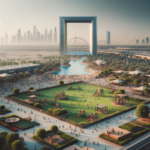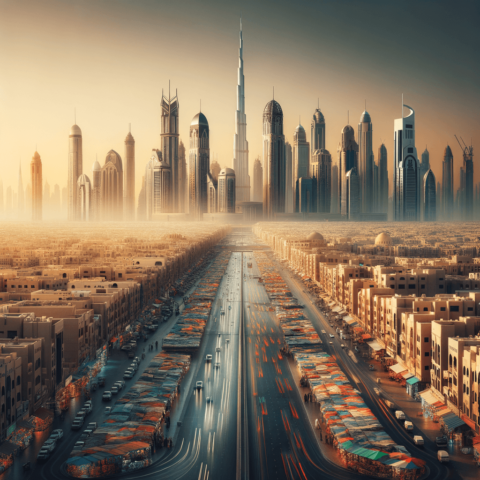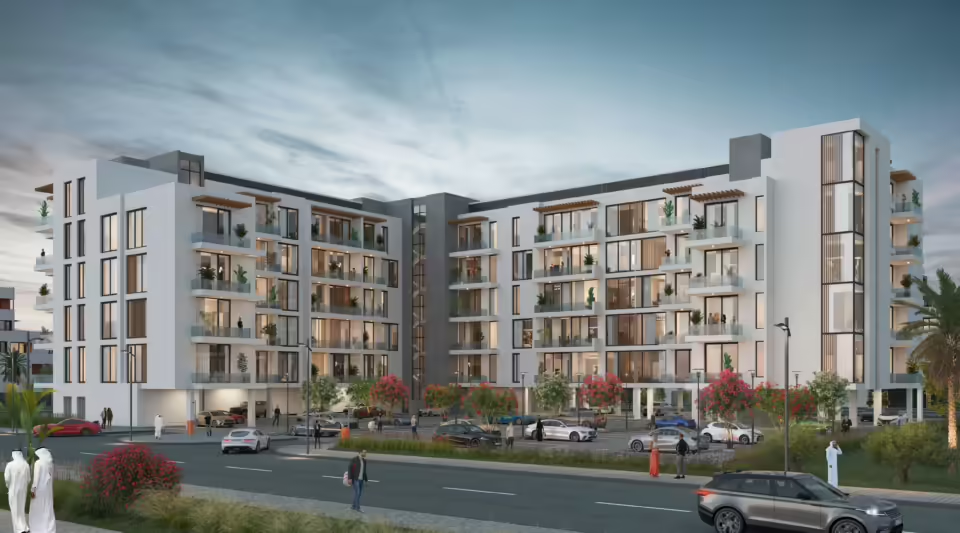
Current Gold Rates and Future Projections for UAE’s Gold Market
July 23, 2024
Dubai Municipality Parks Attract Over 16 Million Visitors in H1 2024
July 23, 2024Dubai’s economy continues to showcase remarkable growth, achieving a GDP of AED 115 billion in the first quarter of 2024. This article delves into the key sectors propelling this growth, offering tourists and investors insights into the city’s dynamic economic landscape.
Overview of Dubai’s Economic Growth
Dubai’s remarkable first quarter of 2024 has showcased robust economic growth, continuing its trend as a global financial powerhouse. Spearheaded by strategic initiatives and diversified investments, the emirate has seen its GDP grow by an impressive 4.7% compared to the same period in 2023, which had itself marked a considerable post-pandemic rebound.
Key economic indicators illustrate a landscape of solid progression. Consumer spending surged by 9% year-on-year, driven by an influx of tourists and burgeoning e-commerce activities. The employment rate has exhibited a positive trajectory, with a 2% increase in job creation, particularly in the tourism and tech sectors.
One of the standout metrics involves foreign direct investment (FDI), which has risen by 6.3% compared to the first quarter of 2023. This influx is reflected in the numerous new business ventures and infrastructural projects springing up across the city. Moreover, the Dubai Financial Market experienced a record-breaking quarter, with stock indices climbing by 8% and a sharp rise in trading volumes.
Real estate also played a pivotal role, continuing its recovery with a 10% increase in property sales and rentals, attributed to high demand for both residential and commercial spaces. These indicators, among others, underpin Dubai’s thriving economy and present a fertile ground for investors and tourists alike looking to capitalize on the emirate’s dynamic growth.
Next, we delve deeper into the specific sectors propelling this remarkable economic boom, focusing on the pivotal roles played by transportation, financial services, trade, and real estate, among others.
Key Sectors Driving Growth
Several key sectors continue to fuel Dubai’s robust economic growth in the first quarter of 2024. The transportation sector has been a major driver, with an impressive 15% growth compared to the previous year. Major infrastructure projects such as the expansion of the Dubai Metro and the ongoing development of the Hyperloop have significantly contributed to this uptick, enhancing connectivity and easing the movement of goods and people, thereby bolstering trade and commerce.
Financial services also experienced substantial growth, expanding by 12%. Dubai International Financial Centre (DIFC) plays a pivotal role by attracting a plethora of international banks, insurance companies, and investment firms, creating a vibrant financial ecosystem. Enhanced regulatory frameworks and innovative financial products continue to draw significant foreign direct investments, further solidifying Dubai as a global financial hub.
Trade remains at the core of Dubai’s economy, showing a robust 10% growth. The emirate’s strategic location, coupled with its world-class ports and logistics infrastructure, keeps it as a nerve center for global trade flows. Recent trade agreements and a focus on emerging markets have opened new avenues, boosting trade volumes and contributing significantly to the GDP.
In the real estate sector, a 8% growth has been noted, driven by both local demand and expatriate investment. Landmark projects such as the Dubai Creek Tower and new residential developments in emerging neighborhoods add to this momentum. The sector’s performance is also buoyed by favorable regulatory changes, offering greater ease in property transactions and ownership for foreign investors.
Other sectors like tourism and technology are not far behind. With a 12% growth in tourism, thanks to major events like Expo City Dubai and continuous promotion of Dubai as a premium destination, the hospitality industry is witnessing a surge in occupancy rates and revenue. Technology, driven by smart city initiatives and innovation parks, has grown by 9%, leading to job creation and advancements in digital infrastructure.
The combined contributions from these sectors underscore the resilience and dynamism of Dubai’s economy, propelling its GDP growth and creating a myriad of opportunities for investors and tourists alike.
Visionary Leadership and Future Plans
Visionary leadership has been the cornerstone of Dubai’s rapid economic ascent. The emirate’s leadership, spearheaded by His Highness Sheikh Mohammed bin Rashid Al Maktoum, has provided a clear, ambitious roadmap for development. Under his guidance, initiatives like the Dubai Economic Agenda (D33) and the Dubai Social Agenda 2033 are driving the transformation.
The Dubai Economic Agenda (D33) aims to double the size of Dubai’s economy by 2033, making it one of the top three cities globally in terms of economic power. This roadmap includes over 100 transformative projects focused on fostering innovation, encouraging investments, and promoting sustainability. One of the standout aspects is the support for startups and small and medium enterprises (SMEs), which are seen as vital engines of growth and diversification. By reducing bureaucratic hurdles and providing financial incentives, Dubai is positioning itself as a global hub for entrepreneurship.
Complementing the economic vision, the Dubai Social Agenda 2033 seeks to enhance the quality of life for residents and expatriates. This initiative includes developing world-class healthcare facilities, improving educational institutions, and ensuring robust social welfare systems. These efforts not only contribute to a more productive workforce but also make Dubai a more attractive destination for skilled professionals worldwide.
This synergy between economic and social strategies underlines a holistic vision for sustainable growth. The leadership’s forward-thinking approach ensures that every sector, from trade and real estate to financial services, aligns with the overarching goals. These comprehensive plans are laying the groundwork for a resilient, diversified economy, creating an environment ripe with opportunities for both investors and tourists.
Implications for Tourists
The economic growth of Dubai, driven by visionary leadership and strategic plans like the Dubai Economic Agenda (D33), translates into an expansive array of opportunities and experiences for tourists. As a primary beneficiary of this rich economic environment, the tourism sector in Dubai has seen remarkable advancements.
High hotel occupancy rates serve as a testament to Dubai’s soaring popularity among international visitors. During the first quarter of 2024, hotel occupancy rates surged, with many hotels reporting rates close to full capacity. This surge can be attributed to the city’s enhanced luxury and hospitality offerings, which now include newly opened five-star resorts, boutique hotels, and an increase in serviced apartments, all catering to diverse tastes and preferences.
The city has also welcomed increased international visitors, drawn by a combination of world-class infrastructural developments and a robust events calendar. Iconic attractions such as the Burj Khalifa, the Dubai Mall, and the historic Al Fahidi district continue to captivate tourists, while newer attractions like the Expo City Dubai add fresh allure. Coupled with a rise in cultural festivals, sporting events, and global conferences, Dubai’s appeal as a top-notch destination is broadened.
Additionally, economic prosperity has led to the enhanced services in tourism-related sectors. Visitors now experience improved transportation options including extensive metro lines and electric taxis, more efficient visa services, and contactless payment systems across the city. Restaurants and retail establishments have also upped their game; gastronomic experiences are more varied and accessible, while shopping enthusiasts benefit from an ever-growing number of luxury and traditional marketplaces.
These advancements work synergistically to create a compelling and seamless experience for tourists, ensuring that Dubai remains at the forefront of the global tourism industry. The subsequent economic dynamism further sets the stage for unparalleled investment opportunities, intertwining tourism and investment prospects into a fabric of sustained growth.
Investment Opportunities in Dubai
The impressive economic growth of Dubai in the first quarter of 2024 has created a fertile ground for a multitude of investment opportunities. Key sectors demonstrating remarkable growth potential include real estate, technology, renewable energy, and tourism infrastructure.
**Real estate** continues to be a beacon for investors, with luxury developments and residential projects attracting significant attention. The high demand, driven by expatriates and international buyers, ensures a robust return on investment. Additionally, Dubai’s strategic location as a global business hub fosters a thriving **commercial real estate** market, appealing to corporate investors.
The **technology sector** is another promising arena, supported by government initiatives like Smart Dubai, which aims to transform the city into a leading tech-centric metropolis. Investment in startups and tech enterprises involved in blockchain, artificial intelligence, and fintech is steadily rising, capitalizing on Dubai’s supportive regulatory environment and world-class infrastructure.
**Renewable energy**, particularly solar power, is rapidly gaining traction due to Dubai’s commitment to sustainability and reducing carbon footprint. Major projects like the Mohammed bin Rashid Al Maktoum Solar Park present lucrative opportunities for investors looking to contribute to, and benefit from, the green energy movement.
Investment in **tourism infrastructure** aligns closely with the increased influx of international visitors, as discussed in the previous chapter. Development in hospitality, entertainment, and cultural venues ensures that the city remains a top destination for travelers, thereby providing steady revenue streams for investors.
Investing in Dubai offers **benefits** such as tax-free income, a stable political environment, and a proactive government dedicated to economic diversification and innovation. These factors collectively make Dubai an attractive and lucrative destination for investors seeking high growth potential and long-term gains.
Conclusions
Dubai’s 3.2% economic growth in the first quarter of 2024 underscores its robust development across various sectors. With visionary leadership, strategic plans, and ample investment opportunities, Dubai continues to thrive as a global economic hub and a prime destination for tourists and investors.





